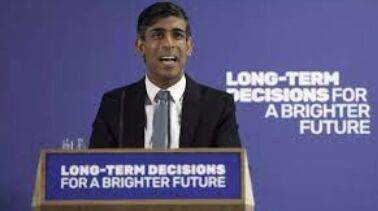Conservative Government's Budget: Tax Cuts and Controversy as General Election Looms
Conservative government's plans to stimulate growth and attract voters ahead of the general election, including a significant tax cut for workers despite predictions of lower growth and high inflation. It also addresses the impact of the Covid-19 pandemic and rising energy bills, as well as the opposition's criticism of the tax cut.
The Conservative government of Britain has unveiled plans aimed at stimulating growth and attracting voters ahead of the upcoming general election. The package includes a significant tax cut for workers, but also predicts lower growth and high inflation. Finance minister Jeremy Hunt presented a package of 110 measures designed to boost the ailing economy and business investment by £20 billion ($25 billion) annually. The budget announcement sets the stage for a fierce battle between the Conservatives and the main opposition Labour party.
The government is seeking to address the impact of the Covid-19 pandemic and rising energy bills caused by Russia's invasion of Ukraine, which have led to economic challenges and financial struggles for households. The tax cut that garnered the most attention is the revamp of national insurance, which is a payrolls tax paid by both employees and employers. The main national insurance rate will be reduced by two percentage points, resulting in significant savings for workers. This move has been hailed as the "biggest permanent tax cut in modern British history" and is estimated to benefit 29 million workers, totaling £9.0 billion per year.
However, Labour's economy spokeswoman Rachel Reeves criticized the tax cut, arguing that it does not adequately compensate for the tax hikes imposed during the Conservatives' 13 years in power. In addition to the tax cut, the government aims to address the cost-of-living crisis by making changes to benefit payments, housing allowances, and state pensions while freezing alcohol duty. The budget also includes a confirmed tax break for businesses, allowing them to reduce tax bills when investing in new equipment.
Despite previous interest rate hikes by the Bank of England to combat inflation, economic activity has been hindered by the cost-of-living squeeze. The Office for Budget Responsibility (OBR) has revised down its economic forecast for 2024 and emphasized the need for increased productivity to drive growth. While inflation has slowed to a two-year low of 4.6 percent, it remains the highest among the G7 nations. Food inflation remains in double digits, and households and businesses continue to face high energy bills following the government's removal of subsidies.
The OBR predicts that inflation will not reach the Bank of England's target of two percent until the second quarter of 2025. This projection raises the possibility of higher interest rates in the future. Currently, the Bank of England's key interest rate stands at a 15-year high of 5.25 percent. With the general election on the horizon, the government's budget aims to address economic challenges, provide relief to households, and foster growth in businesses while navigating a highly competitive political landscape.




